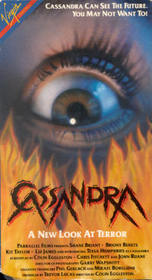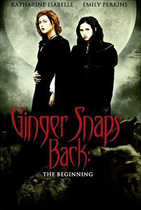Our editor-in-chief Nate Yapp is proud to have contributed to the new book Hidden Horror: A Celebration of 101 Underrated and Overlooked Fright Flicks, edited by Aaron Christensen. Another contributors include Anthony Timpone, B.J. Colangelo, Dave Alexander, Classic-Horror.com's own Robert C. Ring and John W. Bowen. Pick up a copy today from Amazon.com!
Cassandra (1986)
Cassandra is a great film, but one that's more in the vein of classic horror pacing than modern attention deficit syndrome-caterers. Scenes develop slowly and there are very subtle, Eraserhead-like pauses between bits of dialogue in some sections, as well as an exemplary conveying of unspoken communication.
Other than saying that Cassandra is about a young woman who is experiencing visions of horrors that she's not sure really occurred or not, I would rather not describe the plot. Much of the effectiveness of the movie hinges on a gradual realization of what's going on and what the various characters' roles are. However, just so you're not completely in the dark (if you're reading this trying to decide whether you'd like to check out the movie or not), the premise concerns an upper-middle-class Australian family with apparent marital problems. The husband, a photographer, is having an affair, and the wife, a fashion designer, always seems uncomfortable, although we don't know why exactly. Cassandra is their daughter, and her nightmares are getting worse and interfering with her daily functioning.
The first half creates and continues to build a strong sense of foreboding. Although it alters somewhat when the first `real time' killing occurs, the alteration is equally successful, as the foreboding evolves into a story of increasing distrust that conveys the sense of the floor falling out from underneath you that is inherent in distrust. The last third or so - when it turns into a more by-the-numbers stalker story - is a bit less engaging, but it still works.
Cassandra is a lower-budget film with a minimum of sets/settings, but those that are there are used to maximum potential. Particularly captivating is the "old farmhouse" seen in both black and white (in Cassandra's nightmares) and in color at different times. The farmhouse comes across like an evil Andrew Wyeth painting come to life. Also particularly effective is the score, which in its minimalist and slow-moving way, is as responsible for buildling tension throughout the film as any other element.
Any horror fan who doesn't need constant action and gore to be entertained should seek out Cassandra on video, as well as anyone else who enjoys films that masterfully create various atmospheres of unease.








